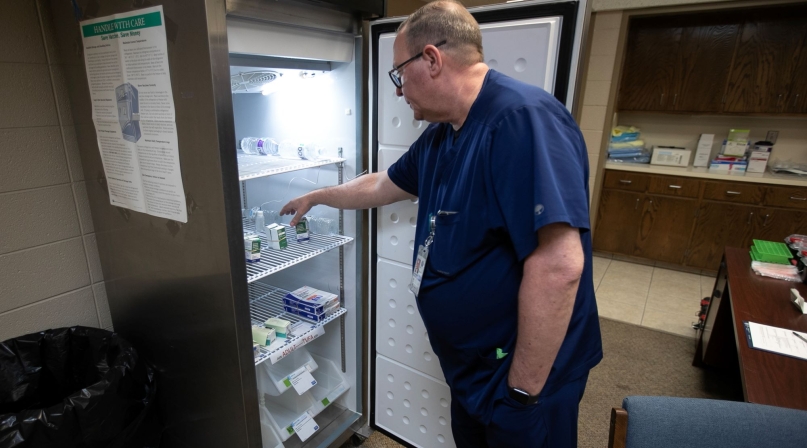Measles outbreak underscores rural healthcare challenges

Key Takeaways
Miles between laboratories and testing sites, a shortage of medical professionals and deteriorating infrastructure is underscoring the health care problems that plague some rural counties as a measles outbreak spreads from the West Texas counties where it began.
The most recent count as of last week shows that 223 cases have been reported nationwide, with the bulk of them in Texas.
So far, 198 people in West Texas counties and 30 in neighboring Lea County, N.M. have become infected with measles since late January. Of those, 23 children have been hospitalized in Texas; one 6-year-old died there, and one adult died in New Mexico.
Measles showed up the first week of February in Andrews County, Texas.
“We had our first exposure when a person showed up in the ER with measles,” said Andrews County Health Director Gordon Mattimoe.
“We had 50-plus exposures we had to follow up on. That was typical of the next couple of weeks.”
State records in Texas show that Gaines County, where the outbreak began, and where there were 138 measle cases so far, has a high rate (18%) of those who are unvaccinated.
“We are seeing folks from Gaines County, they’re coming here for care, to our local hospital or clinic, so we get exposures from that,” Mattimoe said.
Andrews County has been using the old City Hall building as a testing site to keep others from being exposed.
The county is getting the word out about getting vaccinated on social media, local newspapers and lots of correspondence with schools and daycare centers, “trying to get those children with exemptions vaccinated,” Mattimoe said. In Texas, children can refuse vaccinations for religious or conscientious grounds.
His advice to other counties out there: “If you’re seeing vaccination rates drop below 94 percent, you’re going to see cases, you’ve got to keep working on keeping those immunization rates up,” Mattimoe said. (State health departments typically record vaccination rates per county.)
Anyone who has been exposed can benefit by getting vaccinated within 72 hours of an exposure, he noted.
In Ector County, Texas, after two cases popped up there, the county took action, said county health Director Brandy Garcia, who suspects even more people actually have measles there.
“Based off my experience, it’s always more than what you find,” she said.
“People get sick and don’t think about what it could be. If you have a mild reaction, some go undetected.”
Located smack-dab in the Texas oil patch, Ector County is sending any measles test samples to a lab in Travis County and usually sees results within 48 hours.
But without any drivers to take samples on weekends, the County Board recently voted to purchase a specialized freezer to store samples locally when needed.
With spring and summer travel season approaching, the CDC emphasizes the important role that clinicians and public health officials play in preventing the spread of measles.
“Spring break is happening for a lot of these school districts,” Mattimoe said. “We’ll have to see how things are going when they come back after spring break.”
Public health officials should be vigilant for cases of febrile rash illness that meet the measles case definition and share effective prevention strategies, including vaccination guidance.
“We’re scared of things we don’t know,” Garcia said.
“The MMR (measles, mumps and rubella) vaccine is very effective, and it’s been around for a long, long time,” she said.
“Measles is something we don’t normally see. Education is key.”
Related News

HHS Secretary Kennedy touts fixes for obesity, chronic illness, mental health issues
Counties can help improve health outcomes by prioritizing prevention over treatment, Robert F. Kennedy Jr., secretary of the U.S. Department of Health and Human Services told NACo Legislative Conference attendees.

Drug tracking software helps counties identify trends, save lives
Florida counties are using an artificial intelligence tool called Drug TRAC to track and report drug trends, with the aim of providing quicker outreach and saving lives.

White House Executive Order establishes national substance use disorder response
On January 29, the White House issued an Executive Order (EO) establishing the Great American Recovery Initiative, a new federal effort aimed at coordinating a national response to substance use disorder (SUD).
County News
A first-time rural public health leader meets the pandemic head-on

